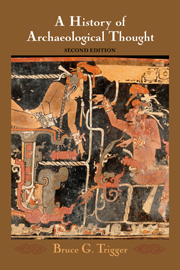Book contents
- Frontmatter
- Contents
- LIST OF ILLUSTRATIONS
- PREFACE TO THE SECOND EDITION
- 1 Studying the History of Archaeology
- 2 Classical and Other Text-Based Archaeologies
- 3 Antiquarianism without Texts
- 4 The Beginnings of Prehistoric Archaeology
- 5 Evolutionary Archaeology
- 6 Culture-Historical Archaeology
- 7 Early Functional-Processual Archaeology
- 8 Processualism and Postprocessualism
- 9 Pragmatic Synthesis
- 10 The Relevance of Archaeology
- BIBLIOGRAPHICAL ESSAY
- REFERENCES
- INDEX
PREFACE TO THE SECOND EDITION
Published online by Cambridge University Press: 05 June 2014
- Frontmatter
- Contents
- LIST OF ILLUSTRATIONS
- PREFACE TO THE SECOND EDITION
- 1 Studying the History of Archaeology
- 2 Classical and Other Text-Based Archaeologies
- 3 Antiquarianism without Texts
- 4 The Beginnings of Prehistoric Archaeology
- 5 Evolutionary Archaeology
- 6 Culture-Historical Archaeology
- 7 Early Functional-Processual Archaeology
- 8 Processualism and Postprocessualism
- 9 Pragmatic Synthesis
- 10 The Relevance of Archaeology
- BIBLIOGRAPHICAL ESSAY
- REFERENCES
- INDEX
Summary
Since the first edition of A History of Archaeological Thought was published in 1989, there has been a significant upsurge of interest in the history of archaeology and a vast increase in the publication of books and papers relating to this topic. As recently as the 1970s, one or two significant books and a handful of papers dealing with the history of archaeology were published each year. At the height of their influence in the 1970s, processual archaeologists proclaimed that the history of archaeology was irrelevant for understanding the development of the discipline, which they argued was shaped by the deployment of ever more rigorous forms of scientific method. This view reduced the history of archaeology to being little more than a form of entertainment or propaganda. Today, a growing number of archaeologists, who accept that what archaeologists believe influences not only the questions they ask but also the answers they find acceptable, maintain that all archaeological interpretations must be evaluated in relation to their historical context. This growing interest has transformed the history of archaeology into being an established subdiscipline of archaeology with its own international bulletin, symposia, encyclopedias, textbooks, and publication series. An increasing number of studies, often based on painstaking archival research and oral histories, are examining the archaeology practiced at specific times and in specific places from a variety of analytical perspectives. These works have made a new edition of A History of Archaeological Thought essential.
Information
- Type
- Chapter
- Information
- A History of Archaeological Thought , pp. xv - xxPublisher: Cambridge University PressPrint publication year: 2006
